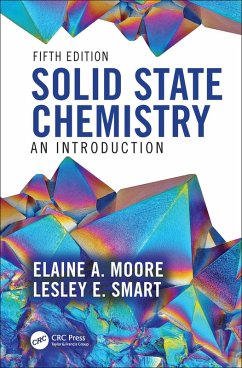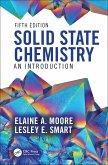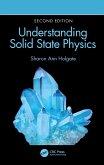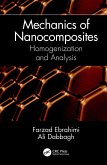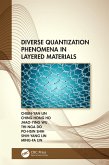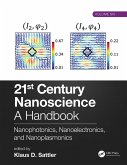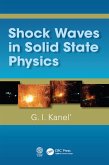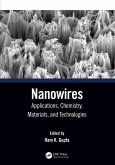42,95 €
42,95 €
inkl. MwSt.
Sofort per Download lieferbar

21 °P sammeln
42,95 €
Als Download kaufen

42,95 €
inkl. MwSt.
Sofort per Download lieferbar

21 °P sammeln
Jetzt verschenken
Alle Infos zum eBook verschenken
42,95 €
inkl. MwSt.
Sofort per Download lieferbar
Alle Infos zum eBook verschenken

21 °P sammeln
- Format: ePub
- Merkliste
- Auf die Merkliste
- Bewerten Bewerten
- Teilen
- Produkt teilen
- Produkterinnerung
- Produkterinnerung

Bitte loggen Sie sich zunächst in Ihr Kundenkonto ein oder registrieren Sie sich bei
bücher.de, um das eBook-Abo tolino select nutzen zu können.
Hier können Sie sich einloggen
Hier können Sie sich einloggen
Sie sind bereits eingeloggt. Klicken Sie auf 2. tolino select Abo, um fortzufahren.

Bitte loggen Sie sich zunächst in Ihr Kundenkonto ein oder registrieren Sie sich bei bücher.de, um das eBook-Abo tolino select nutzen zu können.
Building a foundation with a thorough description of crystalline structures, this book presents a wide range of the synthetic and physical techniques used to prepare and characterize solids. It offers students the opportunity to apply their knowledge in real-life situations and serve them well throughout their degree course.
- Geräte: eReader
- ohne Kopierschutz
- eBook Hilfe
- Größe: 24.52MB
Andere Kunden interessierten sich auch für
![Solid State Chemistry (eBook, PDF) Solid State Chemistry (eBook, PDF)]() Elaine A. MooreSolid State Chemistry (eBook, PDF)42,95 €
Elaine A. MooreSolid State Chemistry (eBook, PDF)42,95 €![Understanding Solid State Physics (eBook, ePUB) Understanding Solid State Physics (eBook, ePUB)]() Sharon Ann HolgateUnderstanding Solid State Physics (eBook, ePUB)102,95 €
Sharon Ann HolgateUnderstanding Solid State Physics (eBook, ePUB)102,95 €![Mechanics of Nanocomposites (eBook, ePUB) Mechanics of Nanocomposites (eBook, ePUB)]() Farzad EbrahimiMechanics of Nanocomposites (eBook, ePUB)75,95 €
Farzad EbrahimiMechanics of Nanocomposites (eBook, ePUB)75,95 €![Diverse Quantization Phenomena in Layered Materials (eBook, ePUB) Diverse Quantization Phenomena in Layered Materials (eBook, ePUB)]() Chiun-Yan LinDiverse Quantization Phenomena in Layered Materials (eBook, ePUB)48,95 €
Chiun-Yan LinDiverse Quantization Phenomena in Layered Materials (eBook, ePUB)48,95 €![21st Century Nanoscience - A Handbook (eBook, ePUB) 21st Century Nanoscience - A Handbook (eBook, ePUB)]() 21st Century Nanoscience - A Handbook (eBook, ePUB)48,95 €
21st Century Nanoscience - A Handbook (eBook, ePUB)48,95 €![Shock Waves in Solid State Physics (eBook, ePUB) Shock Waves in Solid State Physics (eBook, ePUB)]() G. I. Kanel'Shock Waves in Solid State Physics (eBook, ePUB)46,95 €
G. I. Kanel'Shock Waves in Solid State Physics (eBook, ePUB)46,95 €![Nanowires (eBook, ePUB) Nanowires (eBook, ePUB)]() Nanowires (eBook, ePUB)52,95 €
Nanowires (eBook, ePUB)52,95 €-
-
-
Building a foundation with a thorough description of crystalline structures, this book presents a wide range of the synthetic and physical techniques used to prepare and characterize solids. It offers students the opportunity to apply their knowledge in real-life situations and serve them well throughout their degree course.
Dieser Download kann aus rechtlichen Gründen nur mit Rechnungsadresse in A, B, BG, CY, CZ, D, DK, EW, E, FIN, F, GR, HR, H, IRL, I, LT, L, LR, M, NL, PL, P, R, S, SLO, SK ausgeliefert werden.
Produktdetails
- Produktdetails
- Verlag: Taylor & Francis eBooks
- Seitenzahl: 442
- Erscheinungstermin: 3. August 2020
- Englisch
- ISBN-13: 9780429648663
- Artikelnr.: 59879061
- Verlag: Taylor & Francis eBooks
- Seitenzahl: 442
- Erscheinungstermin: 3. August 2020
- Englisch
- ISBN-13: 9780429648663
- Artikelnr.: 59879061
- Herstellerkennzeichnung Die Herstellerinformationen sind derzeit nicht verfügbar.
Elaine A. Moore studied chemistry as an undergraduate at Oxford University and then stayed on to complete a DPhil in theoretical chemistry with Peter Atkins. After a two- year postdoctoral position at the University of Southampton, she joined the Open University in 1975, becoming a lecturer in chemistry in 1977, senior lecturer in 1998 and reader in 2004.She retired in 2017 and currently has an honorary position at the Open University. She has produced OU teaching texts in chemistry for courses at levels 1, 2 and 3 and written texts in astronomy at level 2 and physics at level 3. She is coauthor of Metals and Life and of Concepts in Transition Metal Chemistry, which were part of a level 3 Open University course in inorganic chemistry and co-published with the Royal Society of Chemistry. She was team leader for the production and presentation of an Open University level 2 chemistry module delivered entirely online. She is a Fellow of the Royal Society of Chemistry and a Senior Fellow of the Higher Education Academy. She was co-chair for the successful Departmental submission of an Athena Swan bronze award.
Her research interests are in theoretical chemistry applied mainly to solid-state systems and is author or coauthor of over 50 papers in refereed scientific journals. A long-standing collaboration in this area led to her being invited to help run a series of postgraduate workshops on computational Materials Science hosted by the University of Khartoum.
Lesley E. Smart studied chemistry at Southampton University, United Kingdom, and after completing a PhD in Raman spectroscopy, she moved to a lectureship at the (then) Royal University of Malta. After returning to the United Kingdom, she took an SRC Fellowship to Bristol University to work on X-ray crystallography. From 1977 to 2009, she worked at the Open University chemistry department as a lecturer, senior lecturer and Molecular Science Programme director, and held an honorary senior lectureship there until her death in 2016.
At the Open University, she was involved in the production of undergraduate courses in inorganic and physical chemistry and health sciences. She was the coordinating editor and an author of The Molecular World course, a series of eight books and DVDs co-published with the Royal Society of Chemistry, authoring two of these (2002), The Third Dimension and Separation, Purification and Identification. Her most recent books are (2007) Alcohol and Human Health and (2010) Concepts in Transition Metal Chemistry. She has an entry in Mothers in Science: 64 Ways to Have It All (downloadable from the Royal Society website). She served on the Council of the Royal Society of Chemistry and as the chair of their Benevolent Fund.
Her research interests were in the characterisation of the solid state, and she authored publications on single-crystal Raman studies, X-ray crystallography, Zintl phases, pigments and heterogeneous catalysis and fuel cells.
Her research interests are in theoretical chemistry applied mainly to solid-state systems and is author or coauthor of over 50 papers in refereed scientific journals. A long-standing collaboration in this area led to her being invited to help run a series of postgraduate workshops on computational Materials Science hosted by the University of Khartoum.
Lesley E. Smart studied chemistry at Southampton University, United Kingdom, and after completing a PhD in Raman spectroscopy, she moved to a lectureship at the (then) Royal University of Malta. After returning to the United Kingdom, she took an SRC Fellowship to Bristol University to work on X-ray crystallography. From 1977 to 2009, she worked at the Open University chemistry department as a lecturer, senior lecturer and Molecular Science Programme director, and held an honorary senior lectureship there until her death in 2016.
At the Open University, she was involved in the production of undergraduate courses in inorganic and physical chemistry and health sciences. She was the coordinating editor and an author of The Molecular World course, a series of eight books and DVDs co-published with the Royal Society of Chemistry, authoring two of these (2002), The Third Dimension and Separation, Purification and Identification. Her most recent books are (2007) Alcohol and Human Health and (2010) Concepts in Transition Metal Chemistry. She has an entry in Mothers in Science: 64 Ways to Have It All (downloadable from the Royal Society website). She served on the Council of the Royal Society of Chemistry and as the chair of their Benevolent Fund.
Her research interests were in the characterisation of the solid state, and she authored publications on single-crystal Raman studies, X-ray crystallography, Zintl phases, pigments and heterogeneous catalysis and fuel cells.
1. An Introduction to Crystal Structures 2. Physical Methods for
Characterising Solids 3. Synthesis of Solids 4. Solids: bonding and
electronic properties 5. Defects and non-stoichiometry 6. Solid State
Materials for Batteries 7. Microporous and Mesoporous Solids 8. Optical
Properties of solids 9. Magnetic and Electrical Properties 10.
Superconductivity 11. Nanostructures 12. Sustainability
Characterising Solids 3. Synthesis of Solids 4. Solids: bonding and
electronic properties 5. Defects and non-stoichiometry 6. Solid State
Materials for Batteries 7. Microporous and Mesoporous Solids 8. Optical
Properties of solids 9. Magnetic and Electrical Properties 10.
Superconductivity 11. Nanostructures 12. Sustainability
1. An Introduction to Crystal Structures 2. Physical Methods for
Characterising Solids 3. Synthesis of Solids 4. Solids: bonding and
electronic properties 5. Defects and non-stoichiometry 6. Solid State
Materials for Batteries 7. Microporous and Mesoporous Solids 8. Optical
Properties of solids 9. Magnetic and Electrical Properties 10.
Superconductivity 11. Nanostructures 12. Sustainability
Characterising Solids 3. Synthesis of Solids 4. Solids: bonding and
electronic properties 5. Defects and non-stoichiometry 6. Solid State
Materials for Batteries 7. Microporous and Mesoporous Solids 8. Optical
Properties of solids 9. Magnetic and Electrical Properties 10.
Superconductivity 11. Nanostructures 12. Sustainability
